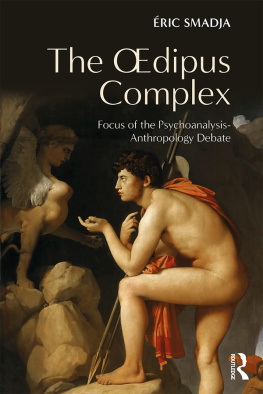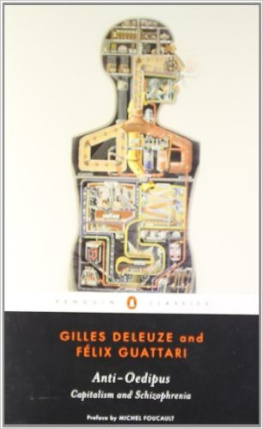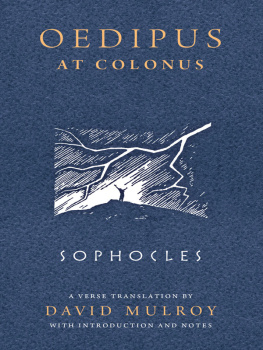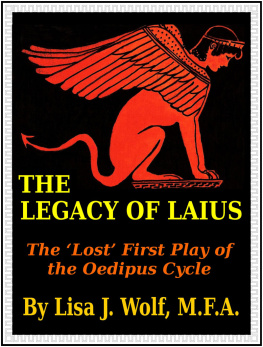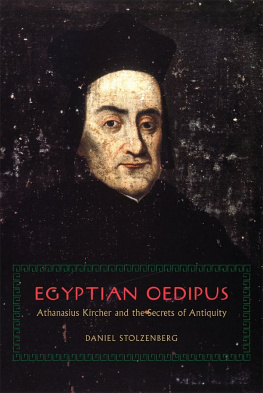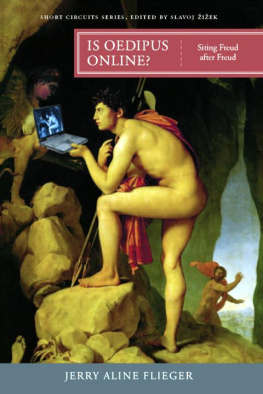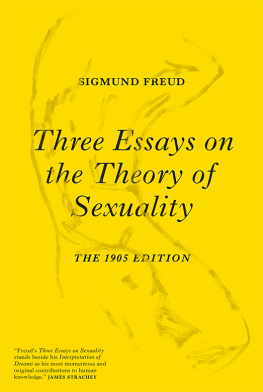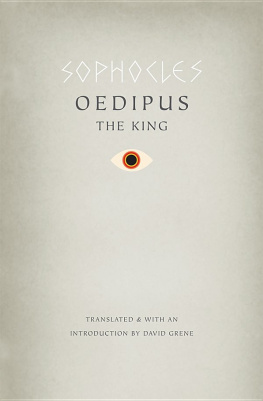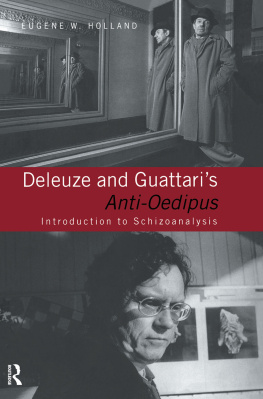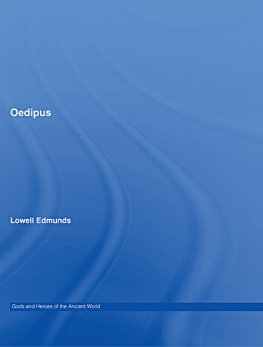Smadja - The Oedipus Complex
Here you can read online Smadja - The Oedipus Complex full text of the book (entire story) in english for free. Download pdf and epub, get meaning, cover and reviews about this ebook. City: London, year: 2017, publisher: Taylor & Francis (CAM), genre: Science. Description of the work, (preface) as well as reviews are available. Best literature library LitArk.com created for fans of good reading and offers a wide selection of genres:
Romance novel
Science fiction
Adventure
Detective
Science
History
Home and family
Prose
Art
Politics
Computer
Non-fiction
Religion
Business
Children
Humor
Choose a favorite category and find really read worthwhile books. Enjoy immersion in the world of imagination, feel the emotions of the characters or learn something new for yourself, make an fascinating discovery.
The Oedipus Complex: summary, description and annotation
We offer to read an annotation, description, summary or preface (depends on what the author of the book "The Oedipus Complex" wrote himself). If you haven't found the necessary information about the book — write in the comments, we will try to find it.
The Oedipus Complex — read online for free the complete book (whole text) full work
Below is the text of the book, divided by pages. System saving the place of the last page read, allows you to conveniently read the book "The Oedipus Complex" online for free, without having to search again every time where you left off. Put a bookmark, and you can go to the page where you finished reading at any time.
Font size:
Interval:
Bookmark:

p.i
THE DIPUS COMPLEX
This book examines the contentious relationship between psychoanalysis and anthropology as it has played out in disputes surrounding the dipus complex. Here, ric Smadja explores the complicated historical and epistemological conditions leading up to the emergence of the conflict between the two disciplines. He considers the origins of each science, the creation of the dipus complex, and the place, role and influence of Freuds key and controversial work Totem and Taboo , both in the history of psychoanalysis and as it connects with anthropology internationally.
Focusing on such key figures as Bronislaw Malinowski, Ernest Jones, Franz Boas, Georges Devereux, mile Durkheim, Claude Lvi-Strauss and Jacques Lacan, Smadja charts the course of the debate as it unfolded during the twentieth century and tracks its contemporary status, with a focus on figures in both France and the United States. Discussing the divergences and convergences between the two fields, he compares and contrasts their historical, epistemological and methodological features and reflects on the new acculturative disciplines emerging from their interaction. The book concludes with a look at what the conflictual history of these two human sciences can tell us about the history of ideas and their processes and modes of communication.
Exploring a dispute which reaches back to the very beginnings of psychoanalysis and anthropology, The dipus Complex will appeal to psychoanalysts in practice and in training, psychotherapists and academics and students of psychoanalytic studies, anthropology and the history of ideas.
ric Smadja is a psychiatrist and a psychoanalyst (Paris and London). He is a member of the Socit Psychanalytique de Paris and the International Psychoanalytical Association (IPA). He is also an anthropologist and an associate member of the American Anthropological Association. He was awarded the IPAs Prize for Exceptional Contribution Made to Psychoanalytical Research (2007). He is the author of several books, including The Couple: A Pluridisciplinary Story (Routledge).
p.iii
THE DIPUS COMPLEX
Focus of the Psychoanalysis
Anthropology Debate
ric Smadja

p.iv
First published in French 2009
by Presses Universitaires de France
First published in English 2018
by Routledge
2 Park Square, Milton Park, Abingdon, Oxon OX14 4RN
and by Routledge
711 Third Avenue, New York, NY 10017
Routledge is an imprint of the Taylor & Francis Group, an informa business
2018 Presses Universitaires de France, Le complexe dOedipe, cristallisateur du dbat psychoanalyse/anthropologie
The right of ric Smadja to be identified as author of this work has been asserted by him in accordance with sections 77 and 78 of the Copyright, Designs and Patents Act 1988.
All rights reserved. No part of this book may be reprinted or reproduced or utilised in any form or by any electronic, mechanical, or other means, now known or hereafter invented, including photocopying and recording, or in any information storage or retrieval system, without permission in writing from the publishers.
Trademark notice : Product or corporate names may be trademarks or registered trademarks, and are used only for identification and explanation without intent to infringe.
British Library Cataloguing in Publication Data
A catalogue record for this book is available from the British Library
Library of Congress Cataloging in Publication Data
A catalog record for this book has been requested
ISBN: 978-1-138-21317-3 (hbk)
ISBN: 978-1-138-21319-7 (pbk)
ISBN: 978-1-315-44888-6 (ebk)
Typeset in Bembo
by Swales & Willis Ltd, Exeter, Devon, UK
p.1
Why choose such a title to tell a tale of the vicissitudes in the relations between these two disciplines born in the nineteenth century? I did so because it seemed to me that the dipus complex, a concept central to psychoanalysis, actually crystallises the body of misinterpretations, distortions, evasions, suspicions, and misunderstandings that, depending on the school of thought and the persons framing them, anthropologists have been able to express in different manners in opposition to psychoanalysis from the time of the first encounter between the fields up until the present day. So it is that the image of the dipus complex as constructed by anthropologists could assert itself as being paradigmatic of the one they were to develop about psychoanalysis.
What object or objects of conflict, even of rejection, within psychoanalysis could well hide and symbolise the dipus complex and its universality? Why such different and contrasting reactions? What would be the underlying reasons for these reactions? In terms of groupal psychoanalysis, what would be the underlying phantasising at work in the anthropologists and psychoanalysts? But also, what are the stakes involved? Are they genuinely scientific, or of another nature? What role could psychoanalysis well have played in this tale of conflict, in particular in its image and treatment of the sociocultural and historical reality?
Could an exploration of the methodological and epistemological characteristics of the two disciplines, such as an exploration of their differences and similarities, provide us with some insights, making this intelligible? Also, what about their respective histories and contributions to enriched understanding? Beyond this tale of conflict between these two human sciences, what does it tell us about the history of the ideas and their processes and modes of communication within the vast limited and boundless field of knowledge, ever in motion?
It is certain that, from the start, a plurality of factors at play complicated the conditions of the birth of this debate that would develop in several stages and in different places. I am proposing to contribute some responses to this multi-faceted inquiry and to suggest some lines of research, but also some principles for pluri- and interdisciplinary collaboration.
p.2
So, the first chapter will deal with the already complex question of the historical and epistemological conditions of the inauguration of this debate, particularly taking into consideration the context of the birth of these two disciplines and the characteristics of the beginning of their existence, the creation of the dipus complex, the status, role and impact of Totem and Taboo , both within the history of psychoanalysis and in the encounter with anthropology and its international context. Then I shall expand this debate along chronological lines and, for historical and epistemological reasons, I shall distinguish between two parts. with the contemporary debate. The historical debate, extending outward from the origins to the 1950s1960s, will differentiate between three major cultural areas: Great Britain, the United States, then France, for the sake of greater intelligibility. The contemporary debate gives priority to France and the United States.
In fact, British social anthropology, with its great figures of the likes of Edward Evan Evans-Pritchard, Raymond Firth, Meyer Fortes, then Edmund Leach and Victor Turner, in particular, did not encourage any interest in psychoanalytical work or encounters with psychoanalysts. Yet, it is imaginable that Turner, for example, who worked extensively on the anthropology of ritual and symbolic activity, would have liked to have engaged in an exchange with psychoanalysts. It must be said that he left Great Britain to pursue his career in the United States as psychoanalytical anthropology was much more extensively developed there.
Next pageFont size:
Interval:
Bookmark:
Similar books «The Oedipus Complex»
Look at similar books to The Oedipus Complex. We have selected literature similar in name and meaning in the hope of providing readers with more options to find new, interesting, not yet read works.
Discussion, reviews of the book The Oedipus Complex and just readers' own opinions. Leave your comments, write what you think about the work, its meaning or the main characters. Specify what exactly you liked and what you didn't like, and why you think so.

